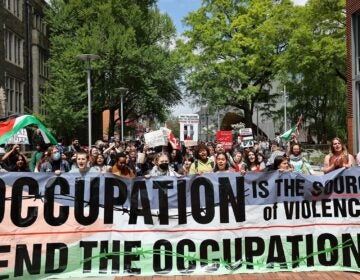SEPTA strike, day four: The latest
Never have folks so welcomed the weekend, at least those who rely on SEPTA to get around. As a strike on the nation’s sixth largest public transit authority enters its fourth day, commuters sick of tangling with the traffic the strike has detoured onto regional highways will get a brief breather.
Not breathing easier: Election watchers. With Election Day now just four days away, watchdogs worry that if the strike stretches into next week, it could severely dent voter turnout in a battleground state during a nailbiter Presidential race. President Obama and the First Lady are expected to join Hillary Clinton for an Election Eve rally in Philadelphia Monday. Turnout for the 2012 presidential election barely reached 60 percent in Philadelphia.
But SEPTA officials this afternoon asked a Philadelphia Common Pleas Court judge to order more than 4,700 striking bus, trolley and subway employees back to work – not just on Election Day, but in general. SEPTA has scheduled a news conference for 4 p.m. today to give details about the injunction filed at 3 p.m.
“SEPTA today filed a lawsuit in the Court of Common Pleas seeking an injunction to end the TWU Local 234 strike, asserting that it constitutes a clear and present danger to the health, safety and welfare of our riders and the citizens of Philadelphia and the region,” the authority said in a statement this afternoon.
The Transport Workers Union Local 234 first went on strike Tuesday morning.
If the authority is not successful in its injunction, another labor organization has vowed to save the day, or rather, Election Day: The Philadelphia Building and Construction Trades Council announced today they will deploy “Voter Vans” to ensure that Philadelphia residents can get to the polls (and home again) Tuesday. Union members will use union vans and other multi-passenger vehicles to drive voters around and soon will set up a hotline for those needing rides to call.
“The Philadelphia Building Trades stand with the striking workers of the Transport Workers Union, but we’re concerned that, if the strike continues through Tuesday, many Philadelphians who wish to cast their vote in this important election may not be able to get to their polling place without public transportation,” said John J. Dougherty, the council’s business manager. “The member unions of the Philadelphia Building Trades and the Carpenters have the vehicular and human resources to get folks to their polling places and return them home safely after voting. We also have the desire to do this to ensure than everyone’s voice is heard and every vote is cast.”
The council endorsed Hillary Clinton for president, but Dougherty emphasized that the voter vans initiative is a nonpartisan effort. “Drivers will not attempt to influence passengers’ voting decisions,” he said in a statement.
Today in Harrisburg, where Pennsylvania Gov. Tom Wolf signed a bill legalizing Uber and Lyft statewide, the governor told reporters he has urged SEPTA and union officials to end the strike: “Thousands of Philadelphians are suffering … I have been talking to both sides. I did this morning.”
The two sides have held daily negotiations since Tuesday. On Thursday, contract negotiations continued late into the night, but no deal was made on a day that saw SEPTA Board Chairman Pasquale T. Deon Sr. and TWU President Willie Brown put out dueling statements accusing the other of delaying a deal. Talks are expected to resume later today at the Sheraton Hotel in Center City.
TWU workers called the strike to demand pension reform, health care changes, and improvements on non-economic issues including shift scheduling, break time and other measures that affect driver fatigue. Pensions have proven to be the main sticking point.
This strike is workers’ 12th since 1975, making SEPTA the most strike-prone transit agency in the country. The last SEPTA bus, trolley and subway workers’ strike, in 2009, lasted six days. SEPTA regional rail workers called a one-day strike in 2014 that ended after President Obama intervened. The longest strike involving TWU workers, in 1977, wore on for 44 days.
Regional rails are not affected by the strike, but train commuters have found long lines, widespread delays, and occasionally suspended service as train travel surges during the strike. To that end, here’s a site where commuters can check the delay status of train routes.
Many commuters took to social media to grouse about the strike, demanding reimbursement for monthly transit passes already bought and an end to a strike that has inconvenienced hundreds of thousands of people. SEPTA normally provides more than 900,000 rides a day to the region’s commuters.
Commuter Jan Wallace vented on SEPTA’s Facebook page with a few math equations: “Hypothetically… It’s been reported the strike is affecting 400,000 riders a day. So … 400,000 x $2.25 = $900,000 (1way, no transfers) $900,000 x 2 (roundtrip) = $1,800,000 $1,800,000 x 3 days = $5,400,000 lost to date. That’s a lot of money lost that could have been used to bridge the difference of company vs union.”
Gigi Lamm lives in South Philadelphia and normally takes a bus to drop her 7-year-old son at school, then takes the subway to her job at the University of Pennsylvania. This week, Lamm has walked an hour each way to get to and from work. But the weekend will bring a new set of complications, she said.
“It’s frustrating; now we’re trying to think through the weekend and all the places we need to go,” Lamm said. “It’s OK for me to walk an hour each way to work, but trying to figure out how to get the kid back and forth to certain places, how to deal with traffic if we choose to drive – the weekend will be very different than the weekdays.”
Still, others kept an eye on the bright side.
“Good way to get my exercise in,” Donna Smith of West Oak Lane said this morning. Smith has been walking to work at the U.S. Housing and Urban Development, instead of parking and taking the subway.
Commuter Jim Getz tweeted: “Thought on my ride to work: so much nicer out on the road without all those SEPTA buses trying to kill me.”
What’s not operating: SEPTA city bus routes, trolley routes 10, 11, 13, 15, 34 and 36, the Market-Frankford Line and Broad Street Line.
What is operating: SEPTA Regional Rail Lines,the Norristown High Speed Line, Trolley Routes 101 and 102 and Suburban bus routes, CCT, LUCY, and Routes 204, 205, 310 and Cornwells Heights Parking Shuttle.
Check SEPTA’s guide for service interruptions here.
This is an ongoing story. Check back with us at NewsWorks.org for updates.
WHYY is your source for fact-based, in-depth journalism and information. As a nonprofit organization, we rely on financial support from readers like you. Please give today.













